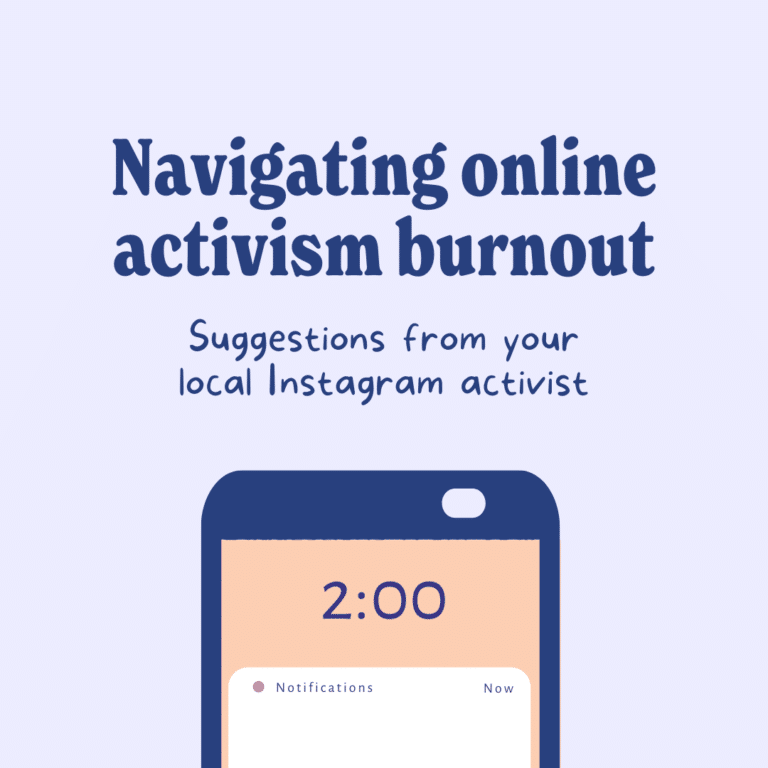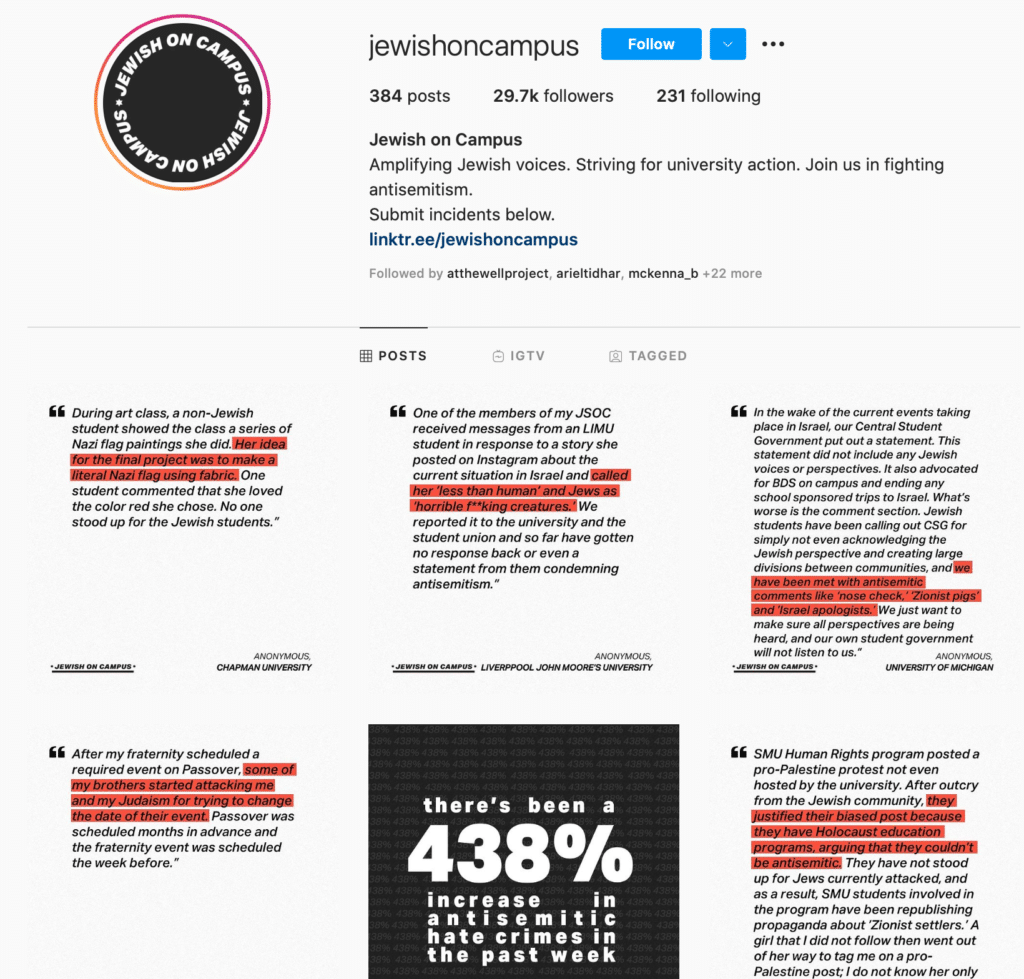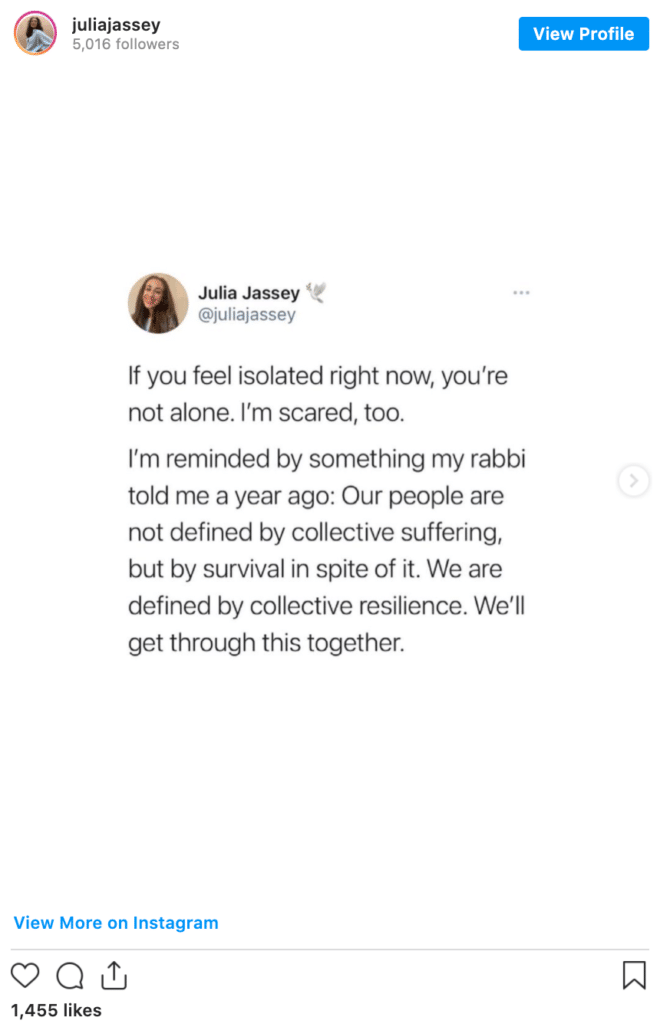
It’s hard to recall exactly when Instagram changed forever. It was sometime in June as daily Black Lives Matter protests took place in response to the murder of George Floyd by Minneapolis police. The world of online memes, selfies, and snapshots from a girls night out quickly transformed into viral political activism and education.
It’s no surprise, then, that there’s been a unique online response to the most recent uptick of the conflict between Israel and Hamas. No longer are the days when we watched conflicts occur on the news. Today, social media is a different type of battlefield — and whether we like it or not, most of us are on the ground.
The social justice slideshow has done a lot of good. It has successfully disseminated news to people who might only get their updates from Instagram, Twitter or Tik Tok. In the same breath, it has become a slippery slope when trying to explain nuanced current events in a limited amount of space.
When our feed is full of antisemitic memes and slideshows boiling a decades-long conflict down to a few swipes, how do we even begin to respond to some of the misinformation out there?
To try and answer this question, Unpacked spoke with Julia Jassey, the CEO of Jewish on Campus, an Instagram account that amplifies Jewish voices, fights antisemitism on university campuses, and — yes — is behind some of the slideshows you’ve been seeing.
Here are Julia’s tips for navigating activism on social media:
1)You don’t need to be an activist, just be a Jew
In a world of Instagram activism, everyone from celebrities and influencers to classmates and your cousin have an opinion and a platform to share it. More than that, we expect the people we follow to take a stance.
As Terry Nguyen put it in an article for Vox, “It no longer [feels] appropriate — even for celebrities and influencers, who tend to exist unfazed by current events — to skip over politics and resume regular programming.”
Given this, you might feel like you need to share, post, or take some sort of online action. It’s great if you do, but it’s also fine if you don’t, says Jassey.
“I think that there are two kinds of responses you can take to antisemitism. One is being a Jewish activist and the other is just being a Jew,” she explains.
“I have had lots of friends who said they don’t want to wear their Magen Davids or don’t want to be visibly or vocally Jewish, but I think there is a tremendous act of strength in just living as a Jew.”
Whatever your Judaism looks like, don’t let external forces stop you from living Jewishly, Jassey says.
2) Build a strong support network
The second response you can take, according to Jassey, is activism.
If you do choose to be vocal, Jassey says, it’s important to consider one thing first.
“I urge anyone who’s considering being vocal to always ensure you have a really strong support system,” she says. “I worked really hard to have a strong support system of people who are also interested in learning and teaching each other, and that’s the only reason why I’m able to be so vocal.”
Community is integral to who we are as a people, and it’s even more important in times of struggle.
“I don’t recommend being like a vigilante Jewish activist,” Jassey told me with a laugh. “I don’t think that you’re going to be as productive as you could be. This work is emotionally taxing and it’s easier when you have a team of people alongside you, supporting you and with you.”
4) It’s okay to be overwhelmed. Take time off
Activism fatigue/burnout is very real. It’s that helpless feeling of: “Am I even making an impact?”
In other news I’ve been yelling on the internet professionally for almost a year and I’m Concerned.
— Julia Jassey 🕊 (@juliajassey) May 26, 2021
Everyone experiences it, says Jassey. But one key to avoiding this unique type of burnout can actually be found in ancient Jewish wisdom.
“I’m definitely not the world’s most observant Jew, but one thing I try to do — and I fail a lot, but I try — is Shabbat,” Jassey says. “I won’t post any activist content on Shabbat, it’s my break. I feel like God gave me this day and I can have 25 hours.”
“When I’m really, really stressed I’m more strict about it, but even if I’m on my phone looking at activist content, I will not make any content myself or engage with anything.”
If you’re burnt out, you won’t be able to show up when you’re needed, Jassey says, so giving yourself that break prevents a burnout later on.
3) It’s in our DNA to cope with humor
Yes, it’s cheesy, but laughter can sometimes be the best medicine.
“I think it’s very important that Jews cope with humor,” Jassey says. “It’s kind of ingrained in our DNA. For many of us, it’s our natural coping mechanism.”
Her go-to is hit sitcom ‘The Office.’
“When everything is hard and the world feels like it doesn’t like us anymore, Michael Scott makes everything feel better,” she said, laughingly.
But in all seriousness, Jassey says it’s essential to find your own way to change your mindset.
“The state of mind you’re in will change your mood even if it’s just for the hour that you’re watching that movie or 30 minutes of watching that TV show… having that mental break is really important.”
Intergeneration trauma is so wild. You’ll be having a hard week and all of a sudden it’s like, “You know who had even harder weeks? All of your ancestors.”
— Julia Jassey 🕊 (@juliajassey) May 25, 2021
5) Preserve your emotional energy
Our energy is one of the most valuable assets we have. Too often on social media, we gift it freely and too frequently, Jassey says.
“You don’t owe anyone your emotional energy. If someone is in your DM’s questioning why you believe what you believe, you don’t owe them an explanation unless you choose to give them one,” she says.
There is a difference between healthy discourse and hostile discourse, Jassey points out. Since our time and energy is not unlimited, we should think wisely about where we use it.
“I have lots of friends who would not define themselves as Zionists, who disagree with me, and we have conversations about it. That’s fine and healthy,” she explains. “But if it’s hostile, that’s not your friend. If they’re going to disrespect the beliefs that are so core to your being, because of your history, your heritage, your faith and your culture, that’s not your friend.”
A note of inspiration
For those fighting antisemitism daily, whether it be through activism or simply existing as a Jew, Jassey had an important message of inspiration: To young Jews and Jewish students, your voice matters more than you may know.
“So much of the Jewish history of activism has been led by Jewish students,” she explains.
One of her favorite examples, Jassey tells me, is The Student Struggle for Soviet Jewry, an organization which spearheaded the American grassroots movement to liberate the Jews of the Soviet Union.
“The marches for Soviet Jewry brought out over hundreds of thousands of people, and were run by Jewish students. That led to Jewish refugees from the Soviet Union, who were living under persecution, to be able to come to the US,” Jassey said.
“It was a tremendous show of strength by Jewish students,” she explains about why this example empowers her activism. “This is our legacy.”
Originally Published May 27, 2021 12:02AM EDT




